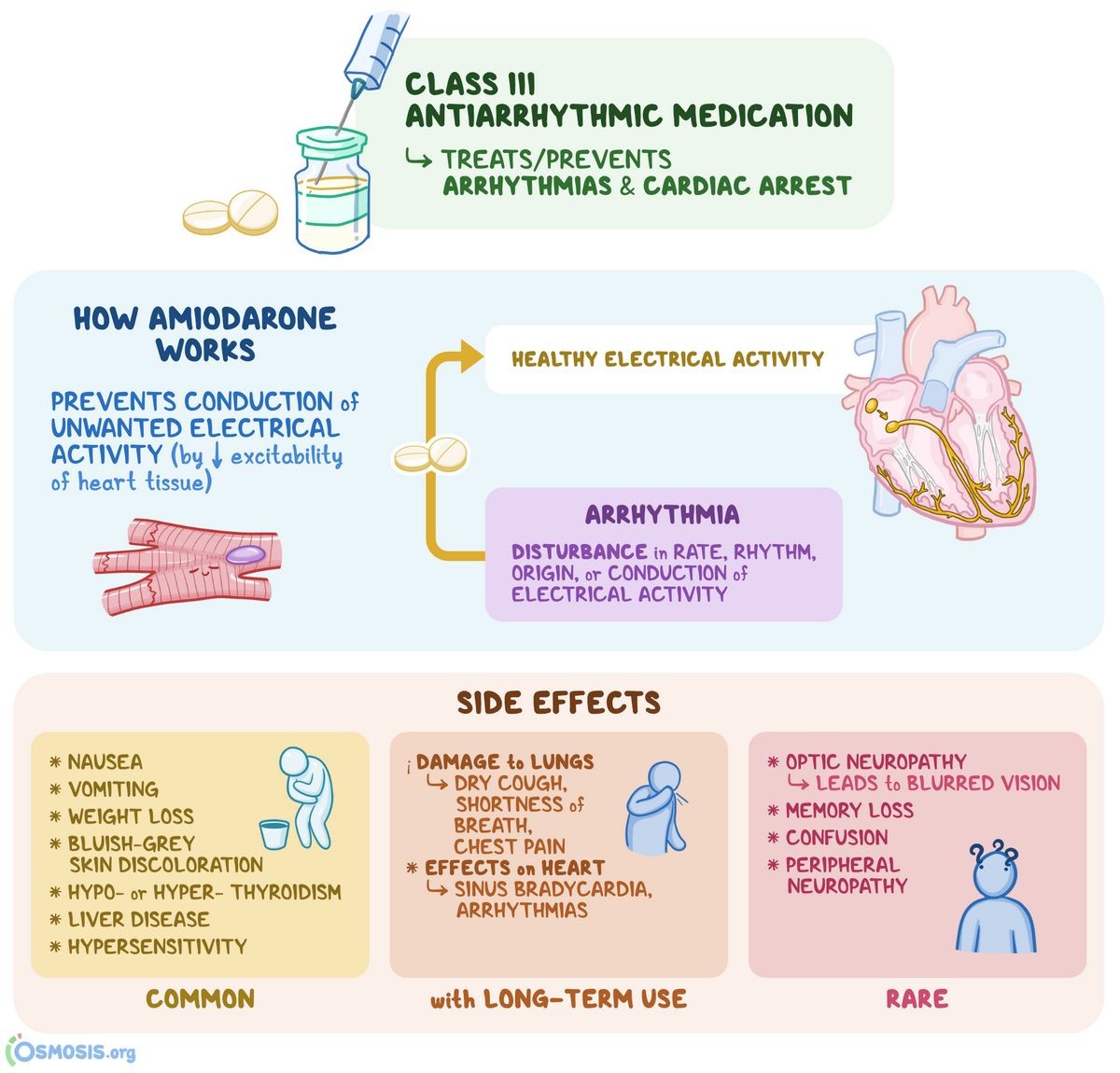
AMIODARONE-INJECTION, Cordarone
Medication Uses How To Use Side Effects Precautions Drug Interactions Overdose Notes Missed Dose Storage Medical Alert WARNING: This medication must be used in a hospital setting under close medical supervision. A response may not be seen until up to 3 weeks after the medication is started. Amiodarone stays in your body for weeks or months, even after you are no longer taking it. If you are taking any drugs that may interact with this medication, caution is advised during and several months after treatment has stopped. (See Drug Interactions section.) Consult your doctor or pharmacist for more information. Severe (sometimes fatal) lung or liver problems have infrequently occurred in patients using this drug. Tell your doctor immediately if you experience any of these serious side effects: cough, fever, chills, chest pain, difficult or painful breathing, severe stomach pain, fatigue, yellowing eyes or skin, or dark urine. Like other medications used to treat irregular heartbeats, amiodarone can infrequently cause them to become worse. Due to the lingering amount of this drug in your body, heartbeat problems may occur even months after you have stopped using it. This drug may cause serious vision changes such as seeing halos and blurred vision. Very rarely, cases of permanent blindness have been reported. Tell your doctor immediately if you develop any vision changes. USES: This medication is used to treat irregular heart rhythms (arrhythmias) and to maintain a normal heart rate. HOW TO USE: This medication is given by injection into a vein (IV) as directed by your doctor. Follow all instructions for proper mixing and dilution with the correct IV fluids. If you have questions regarding the use of this medication, consult your pharmacist. Before using, check this product visually for particles or discoloration. If either is present, do not use the liquid. Do not exceed the recommended rate of infusion. Infusing amiodarone too fast may result in serious side effects such as severe lowering of the blood pressure. Your dosage and infusion rate may be adjusted depending upon your medical condition and response to therapy. A chemical (DEHP) found in plastic IV tubing may harm young children (male reproductive system effects). Amiodarone can cause this chemical to leach out of the tubing. Therefore, caution is advised when using this drug in children. Special administration guidelines should be followed (e.g., multiple bolus dosing) to minimize exposure to DEHP. Consult the pharmacist for more information.
SIDE EFFECTS: Also see Warning section. Diarrhea, nausea, vomiting, or dizziness may occur. If any of these effects persist or worsen, notify your doctor promptly. This drug, when used in combination with simvastatin, may infrequently cause muscle damage (which can rarely lead to a very serious condition called rhabdomyolysis). Tell your doctor immediately if you develop: muscle pain/tenderness/weakness (especially with fever or unusual tiredness). Tell your doctor immediately if any of these unlikely but serious side effects occur: severe dizziness, slowed heartbeat, uncontrolled shaking/tremor, unexplained weight gain, swelling of the hands or feet, irregular pulse, vision changes (e.g., seeing halos, blurred vision, loss of vision), easy bruising/bleeding, persistent sore throat. This drug may cause skin reactions similar to a serious sunburn. Infrequently with long-term amiodarone treatment, you may develop blue-gray discoloring of the skin, particularly of the face and hands. This effect is not harmful and usually reverses, sometimes incompletely, after the drug is stopped. Avoiding prolonged sun exposure may help to prevent this effect. See also Precautions. In the unlikely event you have a serious allergic reaction to this drug, seek immediate medical attention. Symptoms of a serious allergic reaction include: rash, itching, swelling, severe dizziness, trouble breathing. If you notice other effects not listed above, contact your doctor or pharmacist. PRECAUTIONS: Before taking amiodarone tell your doctor or pharmacist if you are allergic to it; or if you have any other allergies. This medication should not be used if you have certain medical conditions. Before using this medicine, consult your doctor or pharmacist if you have: cardiogenic shock, certain types of irregular heartbeats or heart rhythms (e.g., severe sinus node dysfunction resulting in marked sinus bradycardia, second or third degree atrioventricular block, bradycardia with associated syncope except when a pacemaker is used). Before using this medication, tell your doctor or pharmacist your medical history, especially of: liver disease, heart problems (e.g., congestive heart failure, low blood pressure), lung diseases, thyroid problems, upcoming major surgery, electrolyte problems such as low potassium or low magnesium. This drug may make you dizzy; use caution engaging in activities requiring alertness such as driving or using machinery. Limit alcoholic beverages. This medication may make you more sensitive to the sun. Avoid prolonged sun exposure. Use a sunscreen and wear protective clothing when outdoors. Caution is advised when using this drug in the elderly because they may be more sensitive to the effects of the drug, especially slowing of the heartbeat. A preservative (benzyl alcohol) which may be found in this product or in the liquid used to mix this product (diluent) can infrequently cause serious problems (sometimes death), if given in large amounts (more than 100 mg/kg daily) to an infant during the first months of life (neonatal period). The risk is also greater with low birth weight infants. Symptoms include sudden gasping, low blood pressure, or a very slow heartbeat. Report these symptoms to the doctor immediately should they occur. If possible, a preservative-free product should be used when treating neonates. This medication is not recommended for use during pregnancy due to the potential for fetal harm. Consult your doctor for more details. Amiodarone passes into breast milk. Breast-feeding is not recommended while using this drug.
IMAGES
DRUG INTERACTIONS: This drug should not be used with the following medications because very serious interactions may occur: agalsidase beta, dofetilide, certain HIV protease inhibitors (nelfinavir, ritonavir), quinupristin/dalfopristin. If you are currently using any of these medications, tell your doctor or pharmacist before starting amiodarone. Other drugs besides amiodarone which may affect the heart rhythm (QTc prolongation in the EKG) include flecainide, disopyramide, pimozide, quinidine, sotalol, procainamide, and sparfloxacin among others. QTc prolongation can infrequently result in serious, rarely fatal, irregular heartbeats. Consult your doctor or pharmacist for details. Ask for instructions about whether you need to stop any other QTc-prolonging drugs you may be using in order to minimize the risk of this effect. Before using this medication, tell your doctor or pharmacist of all prescription and nonprescription products you may use, especially of: local and general anesthesia, "blood thinners" (e.g., warfarin), cimetidine, cyclosporine, digoxin, fentanyl, heart medications (e.g., diltiazem, verapamil, beta-blockers such as propranolol), other HIV protease inhibitors (e.g., amprenavir, indinavir), methotrexate, phenytoin, rifampin, "statins" (e.g., lovastatin, simvastatin), St. John’s wort. Do not start or stop any medicine without doctor or pharmacist approval. OVERDOSE: If overdose is suspected, contact your local poison control center or emergency room immediately. US residents can call the US national poison hotline at 1-800-222-1222. Canadian residents should call their local poison control center directly. Symptoms of overdose may include weakness, severe dizziness, unusually slow heartbeat, or fainting. NOTES: Do not share this medication with others. Your doctor may want you to check your pulse rate every day while you take this medication. Learn how to monitor your pulse. Laboratory and/or medical tests (e.g., blood pressure, pulse, EKG, chest X-rays, lung tests, liver tests, thyroid tests, eye exams) should be performed periodically to monitor your progress or check for side effects. Consult your doctor for more details. Keep all laboratory and medical appointments. MISSED DOSE: If you miss a dose, contact the doctor immediately. Do not increase the rate of infusion above the recommended rate to catch up. STORAGE: Store at room temperature between 59-77 degrees F (15-25 degrees C) away from light and moisture. Do not store in the bathroom. Keep all medicines away from children and pets. MEDICAL ALERT: Your condition can cause complications in a medical emergency. For enrollment information call MedicAlert at 1-800-854-1166 (USA), or 1-800-668-1507 (Canada).
Report Problems to the Food and Drug Administration
You are encouraged to report negative side effects of prescription drugs to the FDA. Visit the FDA MedWatch website or call 1-800-FDA-1088.
Selected from data included with permission and copyrighted by First Databank, Inc. This copyrighted material has been downloaded from a licensed data provider and is not for distribution, except as may be authorized by the applicable terms of use.
CONDITIONS OF USE: The information in this database is intended to supplement, not substitute for, the expertise and judgment of healthcare professionals. The information is not intended to cover all possible uses, directions, precautions, drug interactions or adverse effects, nor should it be construed to indicate that use of particular drug is safe, appropriate or effective for you or anyone else. A healthcare professional should be consulted before taking any drug, changing any diet or commencing or discontinuing any course of treatment.


